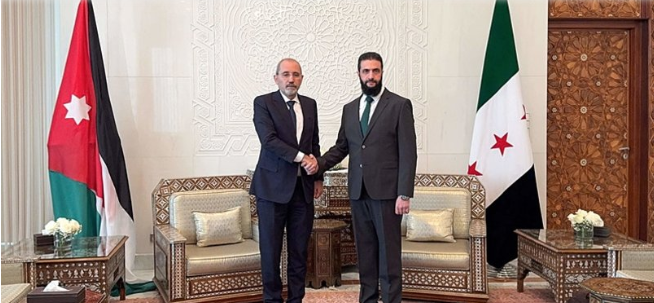Introduction
Foreign a significant diplomatic move, Jordan’s Foreign Minister Ayman Safadi is set to meet Ahmed al-Sharaa, Syria’s recently appointed leader. The high-stakes talks, held in Damascus, mark a crucial step in Jordan’s efforts to strengthen regional stability and rebuild ties with its conflict-torn northern neighbor. Safadi’s visit also includes meetings with several other high-ranking Syrian officials, signaling an intent to engage comprehensively on pressing bilateral and regional issues.
This development comes amidst shifting dynamics in the Middle East, as Arab countries work toward mending fractured relations with Syria following years of isolation due to its civil war.
Ahmed al-Sharaa: The New Face of Syrian Leadership
Ahmed al-Sharaa, a seasoned diplomat and political strategist, has risen to the forefront of Syria’s leadership, succeeding a period of prolonged conflict and controversy surrounding the Assad regime. Known for his pragmatic approach, al-Sharaa has been described as someone capable of steering the nation toward reintegration with the Arab world while addressing the socio-economic rebuilding of his war-ravaged country.
His leadership presents an opportunity for regional players to renew engagement with Syria. Jordan’s active diplomacy in reaching out reflects the shifting regional outlook toward reintegration and dialogue.  For the more information click on this link
For the more information click on this link
Key Topics of Discussion
Safadi’s agenda highlights key concerns shared by both nations and the region, Foreign covering economic cooperation, security, refugee repatriation, and regional diplomacy.
- Border Security and Counterterrorism
The ongoing challenges posed by militant groups along the Jordan-Syria border remain a top concern. Safadi is expected to push for strengthened counterterrorism measures and better communication channels between the two governments to address cross-border smuggling and criminal networks. - Humanitarian and Refugee Crisis
Jordan has borne the brunt of Syria’s decade-long conflict, hosting over 1.3 million Syrian refugees. Safadi’s talks with Syrian officials will focus on creating safe conditions for voluntary refugee repatriation while seeking financial and logistical commitments from the Syrian government to support reintegration efforts. - Economic Cooperation
Restoring trade and economic ties will dominate the conversation, as both nations aim to revitalize bilateral commerce. Syria, eager to rebuild its economy, Foreign views Jordan as a potential partner in logistics, agriculture, and reconstruction projects. - Regional Stability and International Relations
With broader regional implications, Safadi and al-Sharaa are likely to discuss efforts to reduce tensions in the Middle East, exploring Syria’s role in conflict resolution initiatives concerning Palestine, Foreign Lebanon, and other areas of unrest.
Jordan’s Motivations for Engagement
Jordan’s decision to engage with Syria stems from multiple strategic considerations.
- Geopolitical Necessity: As a neighbor directly impacted by Syria’s stability, Jordan recognizes that diplomatic engagement is crucial to securing its borders and ensuring regional peace.
- Economic Benefits: Enhanced cooperation with Syria provides opportunities for trade and investments, particularly in sectors like transportation and energy, Foreign vital for Jordan’s own economic resilience.
- Regional Leadership: Jordan is asserting its role as a stabilizing force in the Arab world, Foreign aligning itself with broader efforts to reintegrate Syria into the Arab League and international forums.
Syrian Perspective: A Path Toward Normalization
For Syria, Safadi’s visit signals a turning point in its gradual return to regional diplomacy. While still under various international sanctions, Damascus views rapprochement with neighbors like Jordan as a critical step in rebuilding its political and economic landscape.
Key interests for Syria include:
- Economic Aid: Securing investments and trade partnerships to jumpstart reconstruction.
- Diplomatic Legitimacy: Bolstering regional and global recognition for its new leadership.
- Security Collaboration: Strengthening coordination to stabilize internal security and address external threats.
Regional and International Implications
- Reintegration into the Arab Fold
Safadi’s meeting with al-Sharaa aligns with broader efforts by the Arab League to normalize ties with Syria after years of suspension. Several Gulf countries have already signaled openness to deeper engagement, hinting at potential shifts in Arab policy toward Syria. - Impact on U.S. and EU Policies
The visit adds complexity to Western policies on Syria. While the U.S. and EU maintain sanctions and advocate for accountability in Syria, they will closely monitor Jordan’s move as part of a larger regional recalibration. - Broader Stability
Jordan’s proactive diplomacy could inspire other nations to initiate dialogues with Syria, Foreign contributing to the stabilization of the Middle East at large.
Anticipated Outcomes of Safadi’s Visit
Safadi’s trip is expected to yield both immediate and long-term outcomes:
- Improved Bilateral Relations: Resuming high-level engagement paves the way for broader cooperation in trade, security, and political matters.
- Refugee Agreements: Both sides are likely to agree on initial steps toward the safe and sustainable return of Syrian refugees, with international support likely playing a role.
- Commitments to Border Security: Joint mechanisms may be announced to combat smuggling and enhance border stability.
Challenges Ahead
Despite the optimism surrounding Safadi’s visit, challenges abound:
- Sanctions and Isolation: Syria remains heavily sanctioned by the U.S. and European Union, limiting its ability to attract investments and partnerships. Jordan risks diplomatic tension with Western allies if its overtures are perceived as undermining international policies.
- Human Rights Concerns: The Assad regime’s legacy continues to cast a shadow over Syria’s path to normalization, with activists urging caution in legitimizing its leadership without accountability for past atrocities.
- Complex Regional Dynamics: Balancing relations with Syria while maintaining alignment with Gulf countries and the U.S. poses a delicate challenge for Jordan’s foreign policy.
 For the more information click on this link
For the more information click on this link
The Road Ahead for Syria-Jordan Relations
Safadi’s engagement with Ahmed al-Sharaa could mark the beginning of a more robust partnership aimed at addressing shared challenges and advancing mutual interests. By setting an example of constructive dialogue, Jordan has an opportunity to influence the region’s approach toward Syria and strengthen its role as a peace broker in the Middle East.
The outcomes of these talks will not only shape Syria and Jordan’s relationship but also impact the broader dynamics of regional geopolitics and the quest for long-term stability in the Middle East.
Conclusion
The upcoming discussions between Jordan’s Foreign Minister Ayman Safadi and Syria’s new leader Ahmed al-Sharaa are laden with potential, symbolizing a turning point in regional diplomacy. As both nations seek to mend ties and address shared challenges, Foreign the success of these talks will set the tone for Syria’s reintegration into the regional and international community. While challenges remain, the willingness to engage reflects a collective desire to move toward stability and progress in a region often fraught with division and conflict. ALSO READ:-Bangladesh Seeks Extradition of Ousted Prime Minister Sheikh Hasina from India: A Diplomatic Crisis Unfolds 2024





